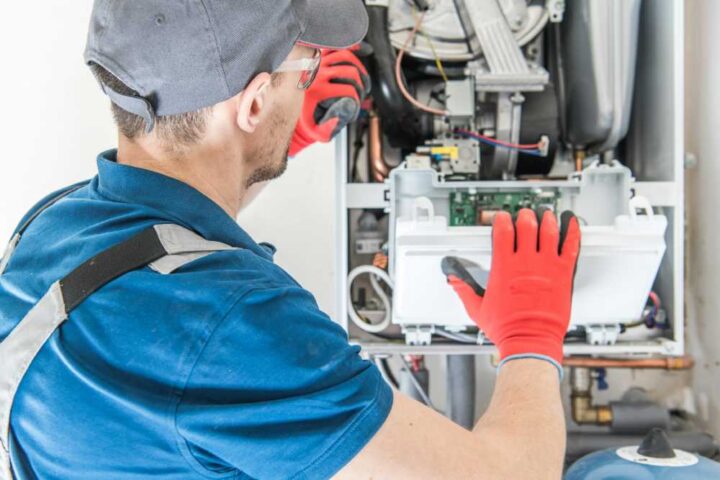The Homeowner’s Guide to Furnace and Boiler Maintenance
Every homeowner knows the comfort and warmth a well-maintained heating system brings, especially during the chill of winter. But beyond comfort, a functional and efficient furnace or boiler is integral to household safety and energy management.
This article will provide a comprehensive understanding of how to keep these critical systems in tip-top shape, ensuring long-term performance without unexpected breakdowns. From recognizing the early signs of trouble to knowing when to call the professionals, like those skilled in HVAC repair, our guide covers all you need to maintain a reliable heating system.

Introduction to Home Heating Systems
The sound of a furnace humming in the depths of winter or the silent warmth emanating from a boiler is often taken for granted until these systems falter. Navigating the complex world of home heating requires a basic understanding of how these systems operate. A furnace generates warm air through burners and blows it throughout your home via air ducts.
At the same time, a boiler heats water and dispatches the resulting steam or hot water through pipes to radiators or underfloor heating systems. Despite their differences in heating methods, both systems share a common need for regular maintenance to ensure efficient and reliable operation. Without it, homeowners risk the discomfort of a cold home and the potential dangers of malfunctioning heating equipment.
Common Furnace and Boiler Issues
Heating system malfunctions often announce themselves through subtle changes before becoming more pronounced. Homeowners may notice uneven heating, with certain rooms remaining cold while others overheat.
Strange noises such as banging, whistling, or rattling could point to issues ranging from loose components to airflow obstructions. Spotting these red flags early can save both money and stress. Among critical signs is a yellow or flickering flame in a gas furnace, which could indicate the presence of carbon monoxide.
Other issues include a lack of heat, persistent odors, or frequent cycling. Understanding these common problems allows homeowners to take proactive measures, ensuring warmth and safety remain uninterrupted throughout the coldest months.
Preventative Maintenance Strategies
Regular preventative maintenance is paramount to avoid the inconvenience and potential hazards of a broken furnace or boiler. It’s the best method for ensuring your heating system stays efficient and reliable over its lifespan.
A well-maintained system is less likely to break down, has a longer operational life, and even reduces energy bills. By scheduling annual inspections, homeowners can identify and address issues that, if left unattended, could compound and lead to costly repairs or replacement.
During these check-ups, trained technicians will typically clean components, check system controls, inspect electrical connections, test thermostat calibration, and verify that the system operates safely and efficiently. Conscientious homeowners who maintain their heating systems diligently often enjoy the peace of mind that comes with a lesser likelihood of emergency repairs.
The Impact of Neglected Heating Systems
The consequences of neglecting furnace and boiler maintenance cannot be overstated. Dust and debris accumulation can significantly impair system efficiency, causing it to work harder to produce the same level of warmth.
This additional strain can lead to premature wear and tear on components, resulting in increased repair costs or even total system failure. Even more concerning is the heightened risk of safety hazards.
A neglected heating system can produce carbon monoxide, a colorless, odorless gas with serious health consequences for those exposed. For this reason, routine maintenance, including checking carbon monoxide detectors, becomes not just a matter of comfort but a critical safety practice.
Energy Efficiency and Your Heating System
Regular maintenance has a direct correlation with energy efficiency. A heating system that receives prompt and thorough maintenance consumes less fuel or electricity to achieve the same heat output. The reasoning is straightforward: clean, well-tuned systems face less internal resistance and operate more smoothly.
This improved efficiency translates into lower monthly utility bills and a reduced environmental footprint. Homeowners dedicated to minimizing their energy usage and costs can consider an energy audit. This process evaluates your heating system’s overall efficiency and pinpoints areas for improvement. By following the recommendations offered by the audit, such as sealing leaks or adding insulation, you can further enhance your heating system’s optimal functionality.
Choosing the Right Professional for Repairs
When a heating problem extends beyond the domain of DIY fixes, it’s crucial to enlist a professional with the expertise to diagnose and resolve the issue accurately. Trusted HVAC professionals should possess the proper certifications and a track record of reliable service.
Researching local service providers, reading reviews, and verifying qualifications before committing to a service is essential. Seeking out technicians familiar with the latest HVAC technology can be beneficial, as they are more likely to handle a wide range of issues efficiently. And remember, trying to cut costs by opting for a less reputable service provider can ultimately lead to additional repairs and even safety risks.
Conclusion: The Value of a Well-Maintained Heating System
In summation, the health of your furnace or boiler is integral to more than just comfort; it’s about safety, cost savings, and energy conservation. Proactive maintenance can catch minor issues before they escalate, extend the useful life of your heating system, and provide peace of mind.
When situations require professional intervention, having a relationship with trustworthy technicians, like those renowned for their HVAC repair skills, is invaluable. Whether you perform some upkeep tasks yourself or rely on experts, the essence lies in understanding the substantial value a well-cared-for heating system brings to your home.


